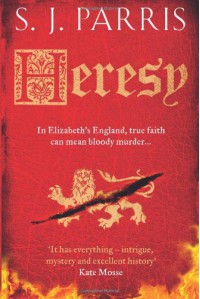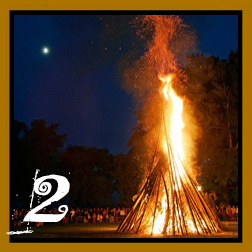Currently Reading






Find me elsewhere:
16 Tasks of the Festive Season: Square 2 - Guy Fawkes Night: Headless Chicken Parade Part 1: Giordano Bruno


Giordano Bruno (1548 – February 17, 1600) was an eminent Italian philosopher, mathematician, poet, and cosmological scientist, whose theories extended the then-novel Copernican model. Bruno proposed that the stars were just distant suns surrounded by their own exoplanets and raised the possibility that these planets could even foster life of their own; and he insisted that the universe is in fact infinite and could have no celestial body at its "center". -- Raised in Naples as a Dominican friar from age 13 onwards, his interest in the writings of Copernicus and Desiderius Erasmus attracted the attention of the Holy Inquisition before he had even turned 30, and rather than become a martyr for the sake of his philosophical and scientific beliefs then and there, he fled from his monastery and from Italy and, having made a name for himself as a scholar in France and attained the patronage of French King Henri III himself, he eventually turned up in Britain in 1583, where he was introduced to Francis Walsingham and agreed to become a spy in Walsingham's network. The Inquisition did eventually catch up with him in 1593, however, and he was tried for heresy and burned at the stake in Rome's Campo de' Fiori in 1600.
While you will be able to glean the above biographical facts (up to 1583) from the beginning of S.J. Parris's Heresy and the book actually has an engaging beginning, it all goes rapidly downhill (or it did for me, anyway) from the moment when the first of several murders occurs. -- Parris's book uses details from Bruno's actual stay in England, in sending him to Oxford for a philosophical debate with the then-Rector of Lincoln College, John Underhill (who indeed opposed Bruno's views). The rest of the story is fictitious, however, and I sincerely hope the personality of this book's Giordano Bruno has nothing whatsoever in common with that of the real-life philosopher and scientist, because if it had, it would be nothing short of a miracle how he ever managed to evade the Inquisition and find his way all the way to France and, later, England.
As for "Bruno the sleuth," leaving aside that initially there isn't even a good reason for him to involve himself in the investigation into the dead man's murder
(show spoiler)the murder and its immediate aftermath are described in such a fashion that anybody who has read Arthur Conan Doyle's
(show spoiler)can't fail to notice one fact pointing very damningly in one particular direction right from the start -- and surely the real-life Giordano Bruno's intellect would have been on par with that of Sherlock Holmes in every respect? And it certainly doesn't get any better by the fact that the one person who thus draws, if not the fictional Bruno's attention, then at least that of this book's reader to themselves in a very conspicious manner, with the same act also eliminates a witness in a manner identical to that used by Ellis Peters in
(show spoiler)... and that in connection with a second murder, a few days later, Parris employs precisely the same slight of hand already used by Agatha Christie in
(show spoiler)
So, I found myself looking in one particular direction from page 95 onwards, and though it turned out that I had the dynamics between two of the persons involved the wrong way around, I never wavered in my belief that the solution lay that way -- which makes a 474-page book a mighty slog to finish, particularly if the book's alleged super-sleuth is running around like a headless chicken, missing just about ever vital clue that doesn't actually explode in his face, and standing by passively and helplessly and / or letting himself be tricked, manhandled and otherwise be manipulated in a way I'd possibly have expected from a rookie investigator, but not from a distinguished intellectual like the real life Giordano Bruno, who after all had, himself, demonstrated considerable cunning in evading the persecution of the Holy Inquisition and make his way, undetected, all the way from southern Italy to France and England.
There is one final twist that I didn't see coming exactly this way around (although I should have, and just possibly might if I'd still cared enough to engage with the book at that point), and I'll also have to give Parris credit for an engaging beginning and for her knowledge of the period -- even though I wondered several times how her version of Giordano Bruno, who had never before been to Oxford in his life, could have the city's layout down so pat within a day at most that the book reads as if Parris had had a map of 16th century Oxford sitting next to her manuscript virtually all the time.
Final note to those who don't care for first person present tense narration: There is an excerpt of the series's second book (Prophecy) included at the end of my edition, and while I didn't actually read it, I've seen enough of it to be able to recognize that it's written in that particular narrative voice. (Heresy is not -- it's in first person past tense.)
I read this book for Square 2 of the 16 Tasks of the Festive Season - Guy Fawkes Night: Any book about the English monarchy (any genre), political treason, political thrillers, or where fire is a major theme, or fire is on the cover.
 1
1 






